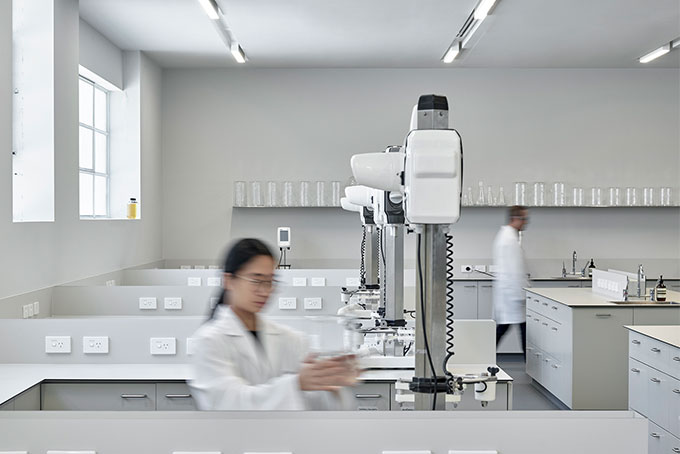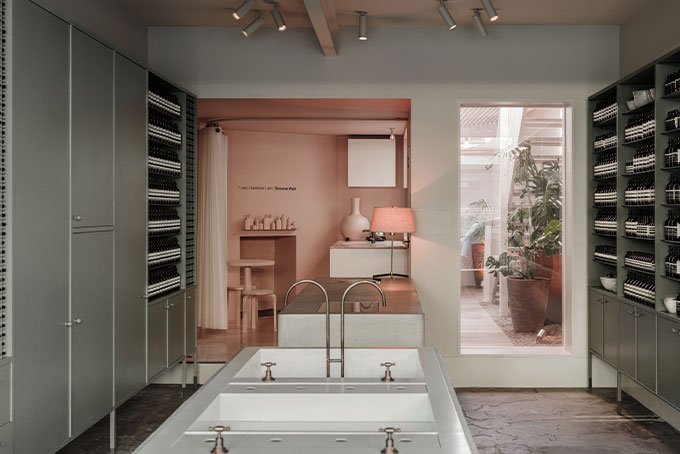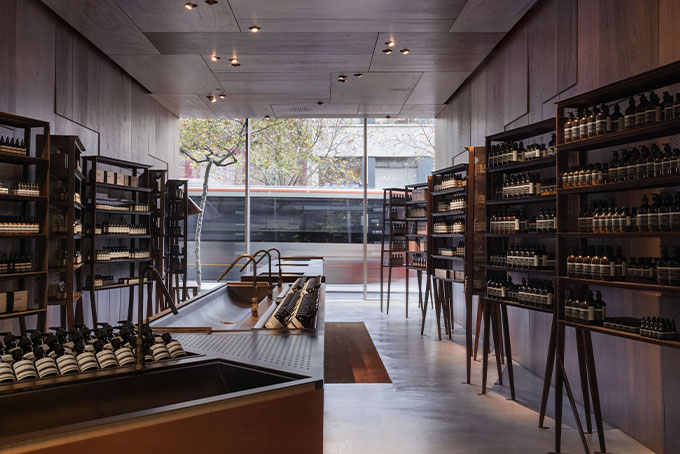In my next life, I’m determined to be a skincare formulator at Aesop. I’m in Melbourne, birthplace of the brand, where for the first time in its 36 years of operation, Aesop skincare has opened its laboratory doors to select press from around the globe. Being here in the Zen space is an unprecedented, Willy Wonka-level of rare and the room is positively vibrating with excitement.
However, this isn’t just a regular tour in starched white coats and goggles, but a hands-on opportunity to create bespoke facial serums alongside some of the leading minds in skin science today. Led by Aesop’s beloved and highly respected R&D director, Samy Hamada, the laboratory comprises individuals from diverse ages, ethnic and scientific backgrounds. From formulators to biochemists, engineers and scientists, there are four men and 17 women in its laboratory, quality control and technology teams. These are the people who have helped shepherd breakthrough products such as the cult Parsley Seed Anti-Oxidant Intense Serum and vitamin-enriched Exalted Eye Serum to life. Rock stars, if you ask me.

This exercise in creating our own botanical serums helps us catch a glimpse of the headspace of these scientists: not only do all formulations need to feel good in the moment, they need to be potent and deliver results long-term. Results matter, and Aesop has the data to prove it. But so do sensorial qualities, such as their texture, slip and scent. Once they’ve perfected their small-batch samples, the products endure countless rounds of heat, pressure, travel and efficacy tests as formulators consider everything from how they’ll be dispensed from machines to how consumers will store, use and enjoy them. In typical Aesop fashion, a variety of factors, from our climate to application, is deeply considered. Forsaking market research and passing fads to create with sincerity and intention is what drives this laboratory; ergo brand forward.
Aesop’s approach to skincare
“Aesop is the hands and hearts of now thousands of people over 36 years who have taken a virtuous and pure concept around how well cosmetics can be manufactured, what are the things you don’t need, what is the way you can communicate, what are the experiences that customers could have both inside and outside the jar,” explains Suzanne Santos, Aesop’s chief customer officer. She is also its first employee, helping to build the brand with founder and hairdresser, Dennis Paphitis.
Ever the storytellers and philosophers, this pursuit of quality has resulted in the Aesop as we know it today. Santos shares Aesop’s singular vision: here, everything is central to the worth of what’s in the jar. Aesop remains one of the few companies, if not the only one, that formulates first and costs second, a company insider remarks.
“Each of us in our individual working lives is focused on the outcome, the balance between the customer and the use of the product, and what is in the jar,” she affirms.
“The purpose for which we exist is the contents of the jar and we don’t lose sight of that.”
“Many tensions are formed in the ability to get these products to our customers, knowing what it becomes to people’s lives.”
Present at the birth of all Aesop skincare products, Santos questions which of these creations will be a part of people’s lives. “I don’t think you can undervalue the power of the brain and the way the aromas bring some kind of passivity, pleasure or unity between the customer and the product. Once people have found that link, it’s very deep. We formulate with a difference. Once somebody has used one of our products, that difference becomes part of the memory bank. People can end up with other brands. But the return, the idea of once you’ve had that experience, it becomes a measurement of what is good and what you want in your life.”
Aesop products have become so intrinsic to daily life for some that the company recently launched its Circularity Trial at select stores in Australia. The return rate to refill its bestselling Resurrection Aromatique Hand Wash is as high as 40 per cent. In Singapore, Aesop’s Rinse and Return initiative encourages returns on used packaging from the brand and other personal care companies.
The language of Aesop skincare
Style is subjective but one thing that all tastemakers can agree on is having a touch of Aesop to elevate the everyday. Head to any discerning residence, restaurant or office and you’ll find an assortment of Aesop’s hand products anchoring the space’s mise-en-scène. So ingrained are these essential, ubiquitous products over the decades that the mention of Aesop is synonymous with culture, exacting design and superlative formulations. However, as my laboratory deep-dive emphasises, Aesop is more than just its greatest hits. As any fan can attest, the Australian brand has proven to be so much more.
While Paphitis has moved on, Santos and others in Aesop embody its DNA today. As a brand, it remains deeply creative and resourceful. Around these halls, you’ll hear talk of how window and store displays were created with minimal budgets, using only the materials at hand, and designed with the heart.
“If I take you back 36 years and that beginning of how we marketed, the relationship with aromas and the fact that we were burning oils in what was then barely an office. If I take you back to the idea that there’s this heady euphoria around the oils that we experimented with and their relationship to creative formulation, it was all born in one time. As we grew, it matured to the actual foundation and the governance of what we have become,” Santos reminisces.






No two Aesop stores are alike and its design language never fails to have an impact on customers and design professionals. Its impressive Collins Street store utilises salvaged and crushed Aesop bottles as render for the walls; its Flinders Lane store employs signature Aesop cardboard boxes to create warmth and texture. Visiting each store presents a golden ticket to new, surprise-filled encounters with the constant being Aesop’s healing hospitality.
Today, Aesop’s generosity extends from the row of hand cream testers that flank the doors of every store to offering warm cups of tea as you shop. Sinks remain at your disposal as you cleanse yourself from the outside and enter this temple of calm, sampling whatever brings your senses joy or relief in the moment. Advisers ply your pouch with samples to take home post-purchase. Self-care on Aesop’s terms will always be an invitation to live in the now.





